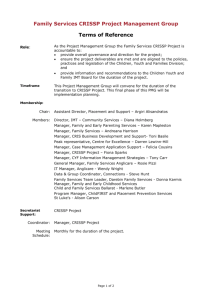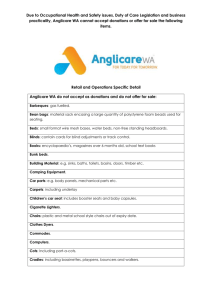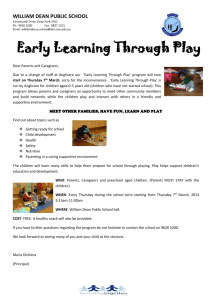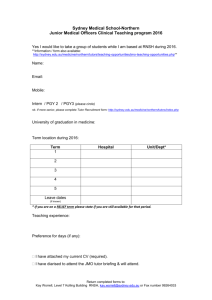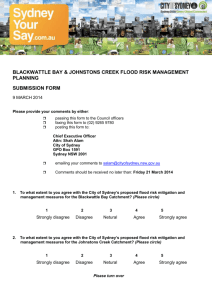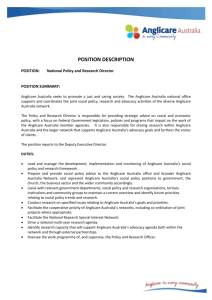1535 Anglicare
advertisement
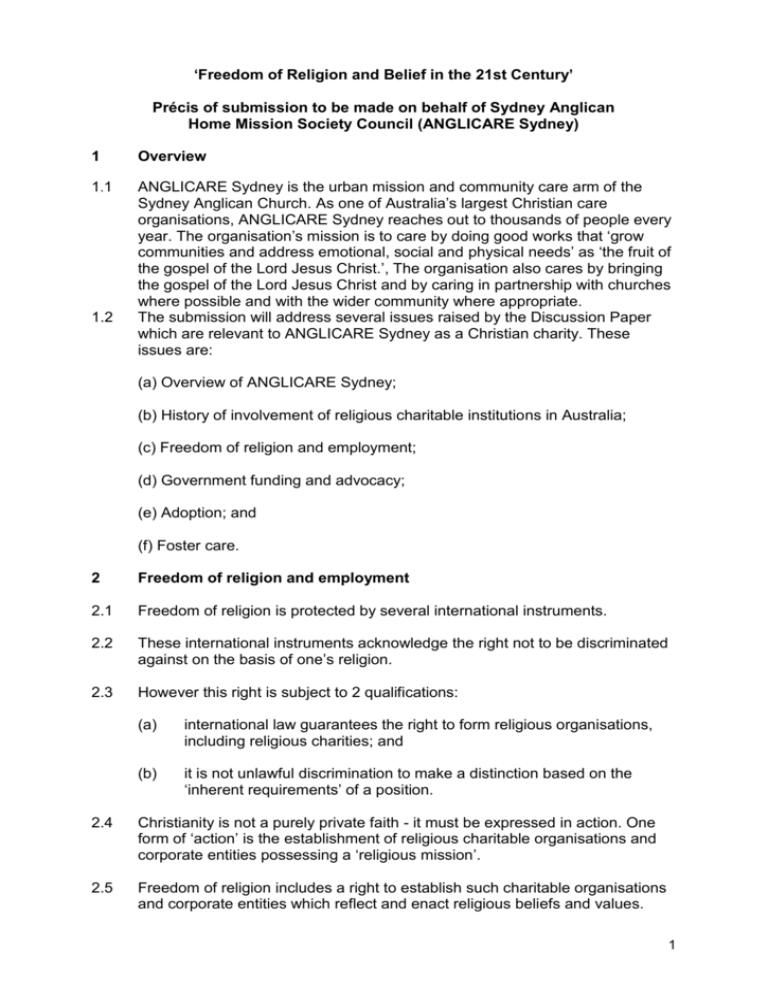
‘Freedom of Religion and Belief in the 21st Century’ Précis of submission to be made on behalf of Sydney Anglican Home Mission Society Council (ANGLICARE Sydney) 1 Overview 1.1 ANGLICARE Sydney is the urban mission and community care arm of the Sydney Anglican Church. As one of Australia’s largest Christian care organisations, ANGLICARE Sydney reaches out to thousands of people every year. The organisation’s mission is to care by doing good works that ‘grow communities and address emotional, social and physical needs’ as ‘the fruit of the gospel of the Lord Jesus Christ.’, The organisation also cares by bringing the gospel of the Lord Jesus Christ and by caring in partnership with churches where possible and with the wider community where appropriate. The submission will address several issues raised by the Discussion Paper which are relevant to ANGLICARE Sydney as a Christian charity. These issues are: 1.2 (a) Overview of ANGLICARE Sydney; (b) History of involvement of religious charitable institutions in Australia; (c) Freedom of religion and employment; (d) Government funding and advocacy; (e) Adoption; and (f) Foster care. 2 Freedom of religion and employment 2.1 Freedom of religion is protected by several international instruments. 2.2 These international instruments acknowledge the right not to be discriminated against on the basis of one’s religion. 2.3 However this right is subject to 2 qualifications: (a) international law guarantees the right to form religious organisations, including religious charities; and (b) it is not unlawful discrimination to make a distinction based on the ‘inherent requirements’ of a position. 2.4 Christianity is not a purely private faith - it must be expressed in action. One form of ‘action’ is the establishment of religious charitable organisations and corporate entities possessing a ‘religious mission’. 2.5 Freedom of religion includes a right to establish such charitable organisations and corporate entities which reflect and enact religious beliefs and values. 1 2.6 A right to establish charitable organisations and corporate entities is meaningless without the right to employ staff who share the religious organisation’s mission, beliefs and values. 2.7 Article 6 of the Religion Declaration states that the right to freedom of thought, conscience, religion or belief shall include the freedom: ‘(b) to establish and maintain appropriate charitable or humanitarian institutions; (g) to train, appoint, elect or designate by succession appropriate leaders called for by the requirements and standards of any religion or belief’ 2.8 Under international law these freedoms are to be subject only to those limitations ‘as are prescribed by law and are necessary to protect public safety, order, health or morals or the fundamental rights and freedoms of others’ (Religion Declaration Article 1.3). 2.9 A balance must be met, therefore, between 2 potentially conflicting rights which both flow from the right of religious freedom: (a) the general right of persons not to be discriminated against on the basis of religion; and (b) the specific right of persons to practise their religious beliefs by the establishment of charities with a religious ethos. 2.10 In circumstances where there is conflict between a general right and a specific right to religious freedom there is a possibility that one or other right may be extinguished. It is a principle of contemporary human rights thought that governments and courts should make every effort to ensure that the effect of the exercise of a general right does not have the effect of extinguishing a specific right. 2.11 In light of this, the most appropriate method to determine an appropriate outcome is to accept in principle that a specific right must, to the extent of any conflict, prevail over a general right. 2.12 It also follows that the rights under Article 1.1 and Article 6 of the Religion Declaration to express religious belief in community with each other by establishing charitable organisations which embody religious beliefs and values must be preserved. 2.13 ANGLICARE Sydney cannot employ, at any level, someone who is hostile to or unsupportive of its mission, vision or values. 2.14 Religious charities such as ANGLICARE Sydney also maintain the right, provided this is done in good faith, to decide whether some or all of the positions offered by it carry a ‘faith dimension’. 2 2.15 To allow for limitation of this right would be to seriously diminish the specific right to religious freedom. The Christian faith and values are not just the foundation and motivation for the work of ANGLICARE Sydney - they also shape the way in which it operates on a day to day basis. 2.16 ANGLICARE Sydney’s identity as a Christian organisation dictates and impacts the decisions it makes at every level. This has 2 non-negotiable implications: (a) ANGLICARE Sydney claims the right under Article 6(b) of the Religion Declaration to practise its religion corporately. This includes a right to decide that all or some roles within it are expected and required to both accept and practice the Christian faith; and (b) ANGLICARE Sydney claims the right under Article 6(b) of the Religion Declaration to shape advertisements and job descriptions at all levels in such a way as to include certain religious dimensions. 2.17 It follows that the terms of Government funding to organisations such as ANGLICARE Sydney must be free of requirements that would prevent ANGLICARE Sydney from making such employment decisions, since to do so would have the effect of undermining the religious character, mission and values of the organisation. This is an important mechanism in preserving the institutional integrity of faithbased organisations which are themselves an outcome of the freedom to express religious belief in a corporate way. 2.18 ANGLICARE Sydney also maintains that, in their application of exceptions to antidiscrimination laws for religious organisations, courts and tribunals: (a) must not be called on to arbitrate on what is, or is not, a church doctrine, tenet, belief or teaching; and (b) must not apply a narrow conception of what a ‘religion’ or ‘religious organisation’ is or should be. Indeed courts and tribunals lack the competence to do so. 3 Government funding and advocacy 3.1 Christian charities such as ANGLICARE Sydney have a long history of providing social services within the Australian community. 3.2 This is not a recent development. 3.3 For instance ANGLICARE Sydney, in both its current and previous forms, has been involved in charitable work for some 150 years. 3.4 Christian charities deliver the overwhelming majority of Australia’s nongovernment welfare services. According to a recent Access Economics report, such charities deal with some 4 million Australians each year. 3 3.5 This relationship has many benefits for society as a whole. 3.6 The provision by Government of funding to religious charities does not accord the Government a right to change the Christian charity’s mission or values. 3.7 The Government funding of services run by religious organisations does not pose a threat to Section 116 of the Australian Constitution. 3.8 The essence of any funding arrangement is quid pro quo; society receives many necessary social services and the religious organisation receives monetary reward to compensate it for the cost of running these services. 3.9 To exclude religious organisations from competing for Government funding based on the merits of their programs would be unjustifiable and unlawful discrimination under the Religion Declaration. 3.10 ‘Gag clauses’ also pose a threat to the healthy independence of religious organisations. 3.11 International law and Australian law both insist that there is a role for religious voices, alongside others, in the policy debates of the nation. Thus persons having a religious faith and religious organisations have every right to participate in public debate in a free and democratic society. 4 Adoption 4.1 2 Christian charities in NSW handle over half of all domestic adoptions in NSW. 4.2 ANGLICARE Sydney is 1 of these Christian charities. 4.3 The principles followed by ANGLICARE Sydney in relation to its adoption services are as follows: (a) All people are deserving of ANGLICARE Sydney’s respect, love and care; (b) ANGLICARE Sydney does not generally exclude clients from its services based on their sexual preferences or sexual practices; (c) In the case of adoption, however, it considers that its primary responsibility lies with the child. The adoptive or foster parents are not the client: the child is the client; (d) ANGLICARE Sydney’s well-known Christian beliefs place a significant emphasis on the family unit as a committed partnership between a man and a woman. This is a reflection of the traditional family values upheld and followed by ANGLICARE Sydney; and 4 (e) 4.4 Furthermore, the Adoption Act 2000 (NSW) supports ANGLICARE Sydney’s position in relation to the relevant matters to be taken into account in the adoption process. ANGLICARE Sydney’s position on this issue can be summarised as follows (a) In NSW adoption law is governed by State legislation; (b) The interests of children in ANGLICARE Sydney’s care are best served by finding a mother and a father to adopt or foster them into a traditional family unit. This is an authentic and fundamental issue of religious belief and is not a view based on a ‘conservative’ view of social mores; (c) Any review of the current law must retain the best interests of children (rather than the interests of any adult) as the paramount consideration in its deliberations; (d) Existing definitions in the Adoption Act 2000 (NSW) where adoptive couples are specified as being of both genders should be retained; (e) Ideological conflict over research into outcomes for children under same-sex care, and gaps in this research, mean that legislators do not have any warrant to effect radical change to adoption law in NSW; (f) The experiences of being mothered and fathered remain among the important environmental factors that constitute optimal conditions for child development; (g) Cautious and caring legislatures should never place itself at the ‘vanguard’ of promoting unnecessary, and potentially adverse, legislative change in the area of adoption law; and (h) Legislatures govern a delicate social ecology that is potentially as fragile as any other natural ecology. Collective human wisdom has generally held that the contribution of a loving female mother and a loving male father is important for the optimal care for a child and is a key ingredient in the best-case scenario for human development. To remove this contribution by a male and a female to the life if a child as a matter of principle for all adopted children, is an unnecessary and insupportable departure from that longstanding wisdom. 5 Foster care 5.1 In a recent NSW Administrative Appeals Tribunal decision, OV and Anor v QZ and Anor (No.2) [2008] NSWADT 115, a male homosexual couple succeeded in their action against Wesley Dalmar Child and Family Care (a Christian charity run by the Uniting Church in Australia) when the couple failed to be accepted by this charity as foster carers for a child. 5 5.2 The charity, an overtly Christian institution, did not consider a same sex couple to be in the best interests of the child. 5.3 As a result Wesley Dalmar was ordered by the tribunal to pay compensation to the couple. 5.4 ANGLICARE Sydney believes this decision has significant ramifications both for the provision by it of foster care services and for its other social services more broadly speaking. 5.5 ANGLICARE Sydney’s position is as follows: (a) ANGLICARE Sydney considers that all people are deserving of its respect, love and care; (b) ANGLICARE Sydney does not exclude clients from its services based on their sexual preferences or sexual practices; (c) In the case of foster care, however, ANGLICARE Sydney considers that its primary responsibility lies with the child. Foster parents are not ANGLICARE Sydney’s client: the child is its client; (d) ANGLICARE Sydney’s well-known Christian beliefs place a significant emphasis on the family unit which is defined as a committed partnership between a man and a woman. This is a reflection of the traditional family values upheld and followed by ANGLICARE Sydney; (e) care are ANGLICARE Sydney maintains that the best interests of children in its best served by locating appropriate heterosexual couples to foster children; (f) Therefore, when seeking to find foster parents for a child, ANGLICARE Sydney unapologetically prefers to find a male and female couple for that child; (g) ANGLICARE Sydney remains committed to ensuring that children are given every chance of obtaining the benefit of both motherhood and fatherhood, (h) To require ANGLICARE Sydney to do otherwise would require it to act contrary to its religious beliefs and to what it firmly believes to be in the best interests of the child. Peter Kell Chief Executive Officer Anglicare, Diocese of Sydney 6
